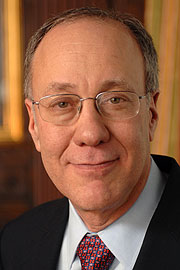Roger Myerson
| Roger Myerson | |
|---|---|
 |
|
| Born |
March 29, 1951 Boston, Massachusetts |
| Nationality | United States |
| Institution |
University of Chicago Northwestern University |
| Field | Game theory |
| Alma mater | Harvard University |
| Doctoral advisor |
Kenneth Arrow |
| Doctoral students |
Michael Chwe Scott E. Page Aytek Erdil |
| Contributions | Mechanism design |
| Awards | Nobel Memorial Prize in Economic Sciences (2007) |
| Information at IDEAS / RePEc | |
Roger Bruce Myerson (born March 29, 1951) is an American economist and winner of the Sveriges Riksbank Prize in Economic Sciences in Memory of Alfred Nobel, sometimes referred to as the "Nobel Prize" for economics, with Leonid Hurwicz and Eric Maskin for "having laid the foundations of mechanism design theory." A professor at the University of Chicago, he has made contributions as an economist and as a political scientist.
Roger Myerson was born on March 29, 1951, in Boston, to a Jewish family. He attended Harvard University, where he received his A.B., summa cum laude, and S.M. in applied mathematics in 1973. He completed his Ph.D. in applied mathematics from Harvard University in 1976. His doctorate thesis was A Theory of Cooperative Games.
From 1976 to 2001, Myerson was a professor of economics at Northwestern University's Kellogg School of Management, where he conducted much of his Nobel-winning research. From 1978 to 1979, he was Visiting Researcher at Bielefeld University. He was Visiting Professor of Economics at the University of Chicago from 1985–86 and from 2000–01. He became Professor of Economics at Chicago in 2001. Currently, he is the Glen A. Lloyd Distinguished Service Professor of Economics at the University of Chicago.
Myerson was one of the three winners of the 2007 Nobel Memorial Prize in Economic Sciences, the other two being Leonid Hurwicz of the University of Minnesota, and Eric Maskin of the Institute for Advanced Study. He was awarded the prize for his contributions to mechanism design theory.
...
Wikipedia
